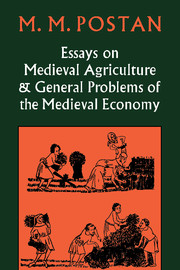Book contents
- Frontmatter
- Preface
- Acknowledgements
- Contents
- I GENERAL
- 1 The economical foundations of medieval economy
- 2 The rise of a money economy
- 3 The fifteenth century
- 4 Some social consequences of the Hundred Years War
- 5 The costs of the Hundred Years War
- 6 Why was science backward in the Middle Ages?
- II AGRARIAN
- Index
- Plate section
6 - Why was science backward in the Middle Ages?
Published online by Cambridge University Press: 05 November 2011
- Frontmatter
- Preface
- Acknowledgements
- Contents
- I GENERAL
- 1 The economical foundations of medieval economy
- 2 The rise of a money economy
- 3 The fifteenth century
- 4 Some social consequences of the Hundred Years War
- 5 The costs of the Hundred Years War
- 6 Why was science backward in the Middle Ages?
- II AGRARIAN
- Index
- Plate section
Summary
It is generally agreed that the Middle Ages preserved for the use of later times the science of the ancients. Therein lies both the scientific achievement and the scientific failure of the medieval civilization. The achievement was all the greater for being indirect. Men in the Dark Ages did not find in the parts of the Western Empire which they occupied a scientific tradition as rich as that which the Arabs inherited in the eastern provinces. Scientific learning came to them later, mostly in the twelfth and thirteenth centuries, from the Arabs and the Jews. To have borrowed and absorbed a scientific culture from peoples which were at that time so distant and so alien was indeed a great achievement. It was all that great, but no greater. What the Middle Ages took over they did not very much enrich. Indeed so small was their own contribution that historians of science are apt to regard the Middle Ages as something of a pause.
Needless to say, the pause was not undisturbed or unbroken. In the course of centuries medieval men improved somewhat their practical arts and added a little to their understanding of nature: and in some periods, such as the turn of the twelfth and thirteenth centuries, their own advances were sufficiently great to make it possible for us to speak of the scientific renaissance, or revival, in the Middle Ages. As a result of the revival, scientific knowledge became much richer than it had once been.
- Type
- Chapter
- Information
- Publisher: Cambridge University PressPrint publication year: 1973
- 3
- Cited by



